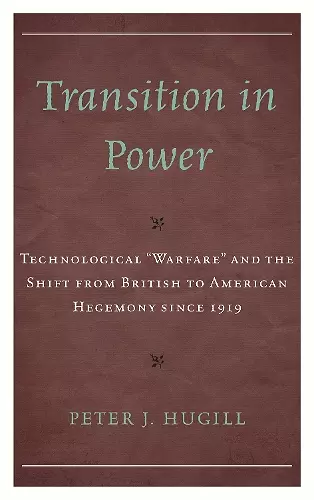Transition in Power
Technological “Warfare” and the Shift from British to American Hegemony since 1919
Format:Hardback
Publisher:Lexington Books
Published:15th Jul '18
Currently unavailable, and unfortunately no date known when it will be back

Hegemonic transitions are never clear, and they usually emerge from a period of multi-polarity in the world-system. Two types of state tend to contend for power: trading states and territorial states, although most states are never “pure” and tend to contain within them multiple polities with different agendas. This book describes the hegemonic transition between two major trading states, Britain and America. British decline began in the late Victorian era, but the transition to American power was slow, and other states also sought hegemony. Transitions between trading states focus on economic struggle, though struggles between trading and territorial states and between territorial states are marked by armed conflict. In 1919 President Woodrow Wilson saw three arenas of competition developing between Britain and America: in international transportation, international communication, and petroleum. But Britain was challenged economically by America as early as 1861 via the Morrill Tariff, her economic hegemony was gone by the 1880s, and she was “defeated” by 1947. From the 1880s on both America and Germany sought to replace Britain as hegemonic power not only through their implementation of protectionist economic policies, but also through the adoption of revised versions of the world-economy, through new technologies, and, in the case of Germany, military power. Britain struggled to stay in place. Britain’s world-economy was that of a pure trading state. Maritime trade in organic materials was organized through global capitalism and control over submarine cable telecommunications rather than territorial possession. America’s rise was greatly helped by being a capitalist power in possession of a secure territorial base in the mid-section of the North American continent, but America suffered from multiple polities competing for power, with the South particularly problematic. Germany developed a radically new world-economy that synthesized resources using organic chemistry. German science and technology began to diffuse to American corporate laboratories before World War One. After that war, diffusion to American laboratories and universities was massive and helped secure American hegemony.
"Peter Hugill is a gifted scholar whose insights, particularly into the impact of technology, enable him to craft complex and novel explanations. In this book he does not disappoint. Drawing on the three themes of transport, communications and oil, he then nests them within a framework structured from a concept of transition, cultural perspectives and the impact of technology to produce a compelling narrative of the transition of pre-eminent world power from Britain to the United States." -- Alan Dobson, University of Swansea
An interdisciplinary and intellectual tour de force how innovations in marine, land and air technologies and telecommunications contributed to America replacing Britain as the global military and political power last century. The thought-provoking analysis is essential for scholars interested in 20th century global geopolitics and world systems. -- Stan Brunn, Univ of Kentucky
- Winner of Stratfor Book Award for Geopolitical Analysis 2018
ISBN: 9781498544221
Dimensions: 242mm x 158mm x 28mm
Weight: 494g
336 pages